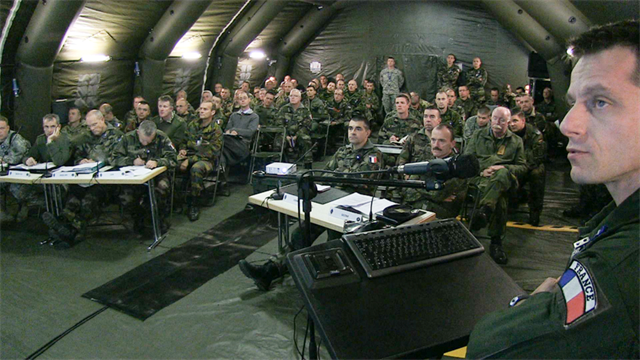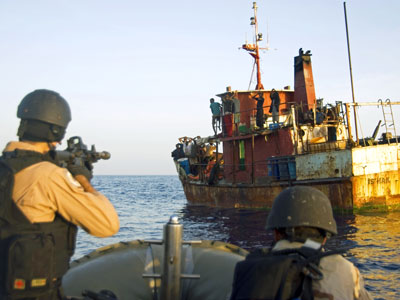[captionpix align=”left” theme=”elegant” width=”300″ imgsrc=”http://natoassociation.ca/wp-content/uploads/2013/11/steadfast-jazz.png ” captiontext=”Courtesy of NATO”]
Steadfast Jazz 2013
From 2 November 2013 to 9 November 2013, NATO hosted a military exercise, “Steadfast Jazz,” at the Adazi Military Base near Riga, Latvia and the Drawsko Pomorskie Training Area in Poland. The objective of the exercise was to test and train the NATO Response Force (NRF) “to make sure that our rapid-reaction force is read to defend any ally, deploy anywhere and deal with any threat.” The training involved air, land, maritime, and special troops totaling around 6,000 troops sent from every member state of NATO and three partner countries – Finland, Sweden, and Ukraine. Machinery included 350 vehicles, 60 aircrafts and helicopters, 12 ships, and one submarine.
Secretary General of NATO, Anders Fogh Rasmussen, in the opening remarks during the monthly press conference by the Secretary General, called NRF’s participation a “graduation test” to oversee the coordination relationship between commanders and troops in combat and commands from the headquarters in Brussels. On 6 November 2013, Secretary Rasmussen visited Latvia for exercise briefings and general discussions on Baltic regional security.
Zapad Russia-Belarus Drill in September 2013
Like almost every other military exercise, there seems to be an implicit spectator. Latvian Defense Minister, Artis Pabriks noted that in the last five years, “Russia has been increasing its assertiveness in the Baltic.” This includes rumors of a possible airbase in Belarus, conveniently situated near the borders of Belarus and Lithuania. The presence of the NRF not only tests capability of this special force but gives the Baltic States an understanding of what to expect should it require NATO assistance.
Steadfast Jazz 2013 comes just over a month after the annual Russia-Belarus Drill, Zapad, in September 2013 near the borders of Poland and Lithuania. International Editor for The Economist Edward Lucas noted in an interview with Edvardas Pocius at The Lithuania Tribune, that Steadfast 2013 would be a symbolic forum to discuss “possible contingency plans; i.e. to talk about possible defence against Russia and adoption of certain plans.” Latvian Defense Minister Artis Pabriks was more frank about the Zapad 2013 exercises flying planes near the Baltic borders indicating that Steadfast Jazz exercises are among the first “where we really train to defend our territory.” Lithuanian Minister of National Defence Juozas Olekas was quoted in a recent statement regarding Steadfast Jazz 2013 that it is “a great proof that the Alliance is ready to defend the Baltic States and Poland from any threat.”
Yet, rhetoric aside, it should be noted that both NATO and Russia sent observers for each other’s military exercises.
Baltic-NATO-EU relations, 10-year anniversary
Perhaps of greatest interest is the context that NATO’s presence in the Baltics is placed in. Lithuania is currently the first of the “Baltic sisters” holding Presidency of the Council of the European Union (term dates from 1 July 2013 to 31 December 2013), with Latvia acceding to the Presidency sometime in 2014-2015. On 23 August 2013, The Baltic Way or Baltic Chain (the peaceful civil and political “human chain” demonstrations promoting pro-independence movements in the late 1980s and early 1990s) celebrated its 24th anniversary as the 70th anniversary of the Molotov-Ribbentrop Pact that allowed the former Soviet Union to annex the Baltic States in 1939 were observed. Finally, in spring 2014, the Baltic states will celebrate a decade of membership in NATO and the European Union.
With Steadfast Jazz 2013 being the first major NATO military exercise in the Baltics since membership was achieved in 2004, Estonia sent 134 troops, Lithuania sent 150 troops, and Latvia sent 500 troops. The Baltic States also hosted the Baltic Host 2013 exercises to test the ability of Baltic states to act as Host Nation for NATO allies in case of emergency deployments. In long-term prospects, NATO defense ministers agreed to a large-scale military exercise in 2015 surrounding the implementation of the Connected Forces Initiative (CFI) to be held in Spain, Portugal, and Italy in which the Baltic Battalion (BALTBAT) will serve as a delegation. Steadfast Jazz 2013 serves as a lead-in to the 2015 exercises.




